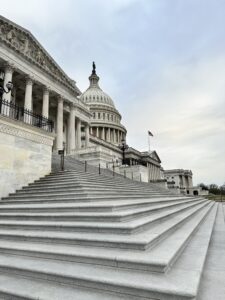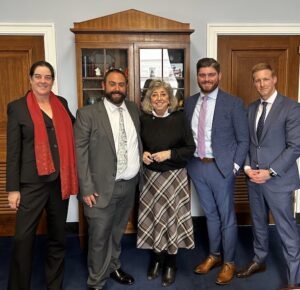
AUVSI recently hosted their annual Hill Day, an opportunity for drone industry stakeholders to gather and meet policy makers, face to face. In this DRONELIFE Exclusive, one attendee’s summary and takeaways.
Continue reading below, or listen:
The following is a guest post by Matt Sloane, CEO and Founder of Skyfire Consulting and Atlanta Drone Group. DRONELIFE neither accepts nor makes payments for guest posts.
Dispatches from Capitol Hill
As I walked down First Street in Washington, DC towards the marble US Capitol building, past the Supreme Court and blooming cherry blossom trees, it hit me.
So many of us think the work of building the drone industry occurs in dusty parking lots and smoky fire scenes; when in fact, the real work of building an industry takes place in these hallowed halls.
Our technology is pretty good; our will to do good is even greater, but without the support of regulators and lawmakers, it cannot live up to its full potential.
It is for that reason that I put on a suit – something I typically reserve for funerals and weddings – and joined an incredible team of like-minded drone pioneers to spend the day in the halls of congress, talking with lawmakers about what’s working, and what needs attention in our industry.
We were all there at the invitation of AUVSI (The Association for Uncrewed Vehicle Systems International) – our industry’s trade group – to put real stories behind the lobbying efforts that group undertakes everyday.
Yes, all of us were excited that the Aviation Rulemaking Committee brought forth a robust set of guidelines for Beyond Visual Line of Sight (BVLOS) operations in 2022 – the kind that will allow Amazon Prime Air to make deliveries to my front doorstep. But those suggested guidelines aren’t likely to even begin the process of becoming rules until Spring of 2024 – 2 years after they were suggested.
Once they do, it’ll be at least 2-3 years of public comments, final rule making and implementation before the full potential of this industry can be realized.

What do we do in the meantime? That was the biggest topic of conversation, as our subgroup of 4 like-minded companies (Skyfire, BRINC, WISPR Systems, Ondas Holdings) on the subject of using drones for public safety and drone first responder operations made our way through the Capitol.
As the FAA’s reauthorization expires in September 2023, legislators are hard at work collecting legislative priorities from those in various sectors of aviation; and two weeks ago, that was us.
So what did those priorities include?
For starters, ensuring that the FAA holds true to a Spring 2024 deadline for the national proposed rulemaking surrounding proposed Part 108 regulations.
In the meantime, it includes finding pathways that allow certain low-risk/high-reward operations such as those undertaken by public safety agencies during emergencies; and leveraging existing safety methods like radar to permit more advanced operations.
Also on the list was extending the life of Section 49 U.S.C. 44807, which gives the FAA the authority to “use a risk-based approach to determine if certain unmanned aircraft systems may operate safely in the national airspace system (NAS) on a case-by-case basis.” That section is scheduled to expire on Sept 30th, 2023.
Next on the list, supporting the competitiveness of the American drone industry against industries in other countries – namely China – where central governments subsidize the development of drone technologies.
Finally, we spoke in depth with the legislative representatives and their staffers about how to use existing pots of money – from Homeland Security and FEMA grant buckets to airport improvement and infrastructure programs to improve the access first responders and critical infrastructure agencies to drones for lifesaving missions.
Staffers representing Senators Ted Cruz (R-TX) and John Boozman (R-AR); Representatives Michael McCaul (R-TX) and Mike Turner (R-OH); as well as Rep. Dina Titus (D-NV) herself and her staff each took a generous amount of time to understand our industry’s issues with the current state of affairs; and pledged their offices’ efforts to help pave new ground.
Certainly in a legislative environment where partisanship reigns, and very little gets done on Capitol Hill without a fight; these meetings are but one step in the right direction. But more importantly, it set a tone for these legislators that drones ARE being used to save lives TODAY; and asks them to do everything possible to support that.
As a manned aircraft pilot myself, I understand the importance of controlling drones’ access to the National Airspace System. Safety is of the utmost importance to all of us, but the longer we wait for common sense and replicable access for drones, the more small companies with very good technology will go out of business waiting for the business of regulation to catch up.
The longer we wait for the slow wheels of bureaucracy to turn, the higher the number of lives we could have saved climbs; and the further behind the US drone industry falls in innovation on the world stage.
We cannot afford for our best and brightest companies, innovators, technology and investment to go off-shore because “regulations take time.”
I thank AUVSI for their continued efforts to push these issues to the forefront; and to push our lawmakers and regulators for a common sense approach towards allowing drones to do the important work they were built for.

Matt Sloane is the CEO and founder of Skyfire Consulting and its parent company, Atlanta Drone Group. Before he founded Atlanta Drone Group in 2014, Matt spent 14 years in various roles at CNN in Atlanta, including 12 years as a medical news producer and special projects manager for Chief Medical Correspondent Dr. Sanjay Gupta. In addition to his work there, he worked as a certified Emergency Medical Technician for Emory EMS, working his way up to Chief of Resources and Planning for the department. Matt is an inaugural member of the National Fire Protection Association (NFPA) technical committee on drones, a technical advisor to the International Association of Fire Chiefs technology council, and an FAA-certified pilot.

Miriam McNabb is the Editor-in-Chief of DRONELIFE and CEO of JobForDrones, a professional drone services marketplace, and a fascinated observer of the emerging drone industry and the regulatory environment for drones. Miriam has penned over 3,000 articles focused on the commercial drone space and is an international speaker and recognized figure in the industry. Miriam has a degree from the University of Chicago and over 20 years of experience in high tech sales and marketing for new technologies.
For drone industry consulting or writing, Email Miriam.
TWITTER:@spaldingbarker
Subscribe to DroneLife here.







[…] AUVSI Hill Day 2023: An Inside View of the Policies, Top Priorities, and Issues Under Conversation … […]